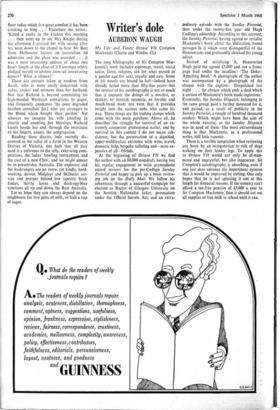Writer's dole
AUBERON WAUGH
My Life and Times: Octave VII Compton Mackenzie (Chatto and Windus 42s) The long bibliography of Sir Compton Mac- kenzie's work includes espionage, travel, social satire, farce, religion, sex (or what passed in a gentler age for sex), royalty and cats. Some of his novels are bound to last—indeed have already lasted more than fifty-five years—but the interest of his autobiography is not so much that it recounts the doings of a novelist, or thinker, or Scottish eccentric, or lovable and much-loved man; nor even that it provides insight into the various nobs who came his way. These things are the trading stamps which come with the main purchase. Above all, he describes the struggle for survival of an ex- tremely competent professional writer, and -by survival in this context I do not mean sub- sistence, but the preservation of a dignified, upper-middle-class existence with wine, travel, domestic help, bespoke tailoring and—most ex- pensive of all—friends.
At the beginning of Octave VII we find the author with an £8,000 overdraft, having lost his regular engagement to write gramophone record reviews for the pre-Cudlipp Sunday Pictorial and happy to pick up a book review- ing job on the Daily Mail. We follow his adventures through a successful campaign for election as Rector of Glasgow University on the Scottish Nationalist ticket, prosecution under the Official Secrets Act, and an extra- ordinary episode with the Sunday Pictorial, then under the twenty-five year old Hugh Cudlipp's editorship. According to this account, the Sunday Pictorial, having agreed to serialise Mackenzie's book about the abdication, found passages in it which were disrespectful of the Hanoverians and profoundly shocked the young editor.
Instead of serialising it, Hanoverian Hugh paid the agreed £5,000 and ran a front- page lead under the headline: 'The Duke:. Appalling Book.' A photograph of the author was accompanied by a photograph of the cheque with the caption: 'Despatched last night . . . the cheque which ends a deal which a section of Mackenzie's book made inglorious.' Eventually, the Sunday Dispatch, belonging to the same group, paid a further thousand for it, and gained, as a result of publicity in the Sunday Pictorial, a couple of hundred thousand readers. Which might have been the aim of the whole exercise, as the Sunday Dispatch was in need of them. The most extraordinary thing is that Mackenzie, as a professional writer, still feels rancour.
There is a terrible temptation when reviewing any book by an octogenarian to talk of dogs walking on their hinder legs. To apply this to Octave VII would not only be ill-man- nered and ungrateful, but also inaccurate. Sir Compton's autobiography is absorbing, even if one just dare advance the impertinent opinion that it would be improved by cutting. One only hopes that he is not spinning it out at this length for financial reasons. If the country can't afford a tax-free pension of £5,000 a year to Sir Compton Mackenzie, then it should cut out, all supplies of free milk in school until it can.


































 Previous page
Previous page